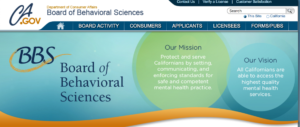DUI and a Psychology License or Behavioral license
DUI and a Psychology License or Behavioral license
This article concerns a DUI and a CA BOP or CA BBS license, and how a DUI arrest, pending DUI case, or DUI conviction can affect a PSY license, LCSW, LMFT, LPCC, or LEP license in California.
The California Board of Behavioral Sciences (CA BBS) has jurisdiction over your license, and can take action if there is a DUI, or other criminal conviction.

The California Board of Psychology (CA BOS) has jurisdiction over your license, and can take action if there is a DUI, or other criminal conviction.
How a DUI can affect your California Psychology License or Behavioral license
If you, or a loved one you know are facing a DUI, and are a therapist, are a CA BBS licensed LCSW, LMFT, LPCC, or LEP, or a BOP licensed psychologist, then special care needs to be taken to protect your license.
As you know, both the California Board of Psychology, (The CA BOP), and the Board of Behavioral Sciences (The California BBS), as divisions of the California State Consumer Department of Consumer Affairs, have jurisdiction over your license. They control the terms of your license if you are a psychologist, or a LMFT, LCSW, LPCC, or LEP.
The Boards warn that any conviction that is “related to the practice” can result in discipline for the criminal conviction(s). That can take the form of warnings, probation, license suspension or even license revocation.
What criminal convictions or complaints that can trigger action?
There are three big categories that usually are a big problem for license-holders: (1) Sex, (2) Drugs (addiction), and… (3) Money. A DUI is only partially related to drugs in that it potentially involves addiction issues.
(1) Sex with clients and your license
Sex with clients is such a big problem, that it has prompted changes in the law, and a handout/booklet for clients. It is considered a betrayal of trust between the therapist patient relationship.
(2) Drug or Alcohol Addiction and your license
This is a bigger and bigger problem with therapists, and is considered a larger issue, and one that a DUI may be evidence of. A drug or alcohol addiction might cause probation, suspension of a license, or required treatment and supervision.
An arrest is seen as a serious indication of a potential problem with drugs and alcohol. Since most counselors believe in recovery, and since the board believes in rehabilitation, they want to see impaired professionals go for treatment. If there is evidence that they continue to see clients while using and drinking, that’s a problem. A DUI and a CA BOP or CA BPP license may be a problem in that case.
Counselors may also get their licenses revoked for committing crimes that result in jail or prison time, and a DUI, depending on the facts, may involve jail time.
(3) Money relationships between a therapist or psychologist and a client
Another potential problem is where the therapist has any money transactions with the client, (other than the fees for therapy), or is an investor in a business with the client.
Money issues are, like sex with a client, considered a possible violation of trust, and those issues are considered especially serious.
What actions can the CA Board of Psychology or the CA Board of Behavioral Sciences take against a license?
California’s Board of Psychology’s Disciplinary Guidelines, indicates that a number of actions or conditions may be imposed, all the way up from closing a case with no action, to revocation.
For public actions, reputation is usually the biggest blow. Discipline-related documents are readily available on the Board’s website.
The CA BBS doesn’t list specific discipline, but they will disclose if any action has been taken against a particular license holder.
What will happen in my particular case after a DUI conviction?
One of the problems in analyzing how a particular case would be handled is the vague nature of the proceedings. With a DUI and a CA BOP or CA BBS issued license, the CA BOP or BBS doesn’t offer any black and white, clear guidelines, only that they will take action for any conviction that is “related to the practice”, and take “appropriate action”, from the choices available to the board.
That is, and should be, different for every case, and highly dependent upon the particular facts of the case. However, the California BOP and BBS are particularly interested in patient safety, so patient rape, assault, or injury relating from the therapists actions, are emphasized. In addition, any addiction issues, because addiction rates are relative high in this field and in these professions, are given special scrutiny. Perjury, fraud, or theft crimes, being crimes of moral turpitude, may also often acted upon.
A DUI that involves alcohol, or drugs, or both, with or without an accident, can be something that the board may become involved with as a sign of an addiction issue. The board wants you to get your DUI police reports, and share them with the board. If it is shown that particularly reckless behavior, like a very high alcohol level, or a severe accident, is involved, that may spur action.
Most common is action when a second DUI, or a third DUI, is involved. At that point, the board can “connect the dots” and declare an addiction issue, that may require special handling, rehabilitation or other treatment, or probation.
How can you protect your CA Psychology License or CA Board of Behavioral Services license after a DUI conviction?
The Board(s), in evaluating rehabilitation of the applicant and their eligibility for a license or registration, will consider the following:
- The nature and severity of the act(s) or crime(s) under consideration as grounds for denial.
- Evidence of any act(s) committed subsequent to the act(s) or crime(s) under consideration as grounds for denial which also could be considered as grounds for denial under section 480 of the Code.
- The time that has elapsed since commission of the act(s) or crime(s) referred to in subdivision (1) or (2) of section 1395.
- The extent to which the applicant has complied with any terms of parole, probation, restitution, or any other sanctions lawfully imposed against the applicant.
- Evidence, if any, of rehabilitation submitted by the applicant.
All applicants are required under law to report all misdemeanor and felony convictions, EXCEPT for:
- Convictions adjudicated in the juvenile court
- Convictions under California Health and Safety Code section 11357 (b), (c), (d), (e), or section 11360(b) which are two years or older.
- Charges dismissed under section 1000.3 of the Penal Code.
What does the CA BOP or CA BBS state regarding a DUI and their rules?
A clue exists from the California Medical Board and how they handle DUI cases. Although a completely difference license, the structure was used in deciding how to handle PSY, LCSW, LMFT, LPCC, or LEP licenses, in how the discipline system works.
The Medical Board states this regarding DUIs or other convictions:
“The Board frequently receives questions about how a criminal conviction might affect a license to practice medicine. The question is not as straightforward as it would appear because every situation is different and is evaluated on a case-by-case basis. … Business and Professions Code Section 2236 states that the conviction of any offense substantially related to the qualifications, functions, or duties of a physician constitutes unprofessional conduct which can be cause for disciplinary action. The Board reviews the records related to every conviction considering not only the record of the conviction itself, but also the underlying issues which led to the arrest and conviction. Section 2236 does not differentiate between a felony and a misdemeanor conviction and consideration about whether disciplinary action is supportable is not based on this distinction either.
A conviction that does not, at first glance, appear to be substantially related to the qualifications, functions or duties of a physician, may, under closer scrutiny, be revealed to be otherwise (e.g; reckless driving, DUIs, and sex crimes). All information related to the criminal case is considered, such as when the arrest occurred; the circumstances surrounding the arrest; any previous history of arrests or convictions; and the physician’s compliance with the court’s terms and conditions.
- The bringing of an indictment or information charging a felony against the licensee;
- The conviction of the licensee, including any verdict of guilty or plea of no contest of any felony or misdemeanor.”
DUI and a CA BOP or CA BBS license Obligations
As a therapist, psychologist or the holder of a CA BOP or BBS license of any kind, you have an affirmative obligation to report any and all convictions. Arrests do not need to be reported. Failure to make a report shall be a public offense punishable by a fine not to exceed $5,000.
Here is the form to report the criminal actions:
- California CA Board of Psychology Reporting – Criminal or Licensing Actions Report
- California CA Board of Behavioral Science Reporting – Criminal or Licensing Actions Report
Note that under the rules, all applicants are required under law to report all misdemeanor and felony convictions, only EXCEPT for:
- Convictions adjudicated in the juvenile court
- Convictions under California Health and Safety Code section 11357 (b), (c), (d), (e), or section 11360(b) which are two years or older.
- Charges dismissed under section 1000.3 of the Penal Code.
Example: Psychology or Behavioral License Action from a DUI
(From public California Board of Psychology BOP discipline records):
On June 11, 2012, the California Board of Psychology placed Michele M. Bieraugel on five years probation with terms and conditions.
Bieraugel is described in the Board document as having “a long history of substance abuse, starting…at approximately the age of 12.”
Further, in adulthood, she attended rehabilitation on several occasions between 1998 and approximately 2010 and “continued a pattern of alternately relapsing and then rejoining her recovery group.”
On or about June 15, 2010, after consuming approximately one and half bottles of wine (and also having taken the tranquilizer Valium and the antidepressant Effexor), she crashed her car into the rear of another vehicle at the bottom of a freeway offramp. She was arrested and charged with driving under the influence of alcohol and other counts.
She pleaded guilty on August 17, 2010 to driving a vehicle with 0.08 percent or more, by weight, of alcohol in her blood. She was placed on five years probation, fined $1,865 and had her driving privileges suspended for six months.
DUI conviction and a CA BOP or CA BBS license Defenses and Strategies
The best strategy we have found when a psychology license is involved is to scrutinize the case to make sure that any findings that may cause a problem by being “related to the practice of therapy” are dismissed, or reduced, wherever possible. That usually means that DUI Defenses based upon the facts of the case, or based upon legal defenses, like an illegal search, an illegal seizure, or a failure to prove the elements of the crime, might be appropriate.
Contact us.
If you have a CA Board of Psychology license, or a CA Board of Behavioral Services license, and are facing a DUI charge, contact us. We can answer your questions about a DUI and a CA BOP or CA BBS license, and can help you. We have experience representing therapists or psychologists in DUI cases.



